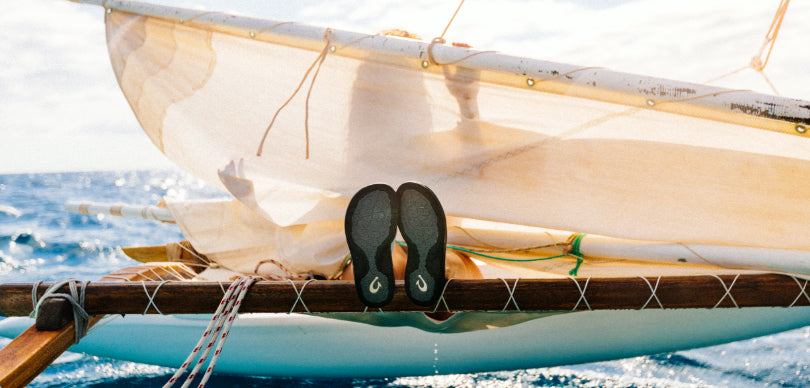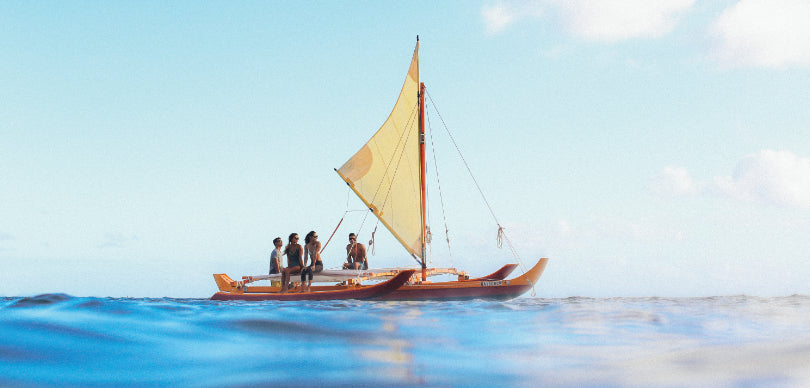Freshwater, which flows from rain-fed mountain streams, is a sacred resource in the Islands and has been a bridge to a broader cultural restoration. For more than 100 years the Kahoma Stream in West Maui’s Kahoma Valley did not flow. Far up the valley, the water was being diverted to for agriculture and energy production in central Maui. Ten years ago, cultural practitioners Tiare Lawrence and Keith Keahi, with broad community support, helped regain water rights for Kahoma Valley residents and their ancestral lands, the first step in restoring life to Kahoma Stream, and their kalo lo‘i, taro fields, downstream.
As fresh water once again flows through kalo lo‘i and into rebuilt fish ponds, Keahi believes that native Hawaiians will once again be able to reconnect with the land and their cultural practices. Keith and Tiare are passionate about sharing their knowledge and traditional Hawaiian values. Here’s what they have to say.
--image_block_a--
Tell us about your community’s work to restore the Kahoma Stream in the West Maui Forest Reserve.
Tiare: Ten years ago, we started to fight for Kahoma Stream. We wanted to see our waters restored. About six years ago, we got our stream restored and since then it’s been nothing but amazing. People didn’t believe that our native aquatic species would return or that there would be enough support in the community to restore it, but our native aquatic species are coming back. Our fishery at the river mouth is thriving and we’re seeing schools of fish that haven’t come in many years. But the real beauty of it is that it’s feeding our people. We’re now able to restore lo‘i to the community and see the benefits of the mauka to makai connectivity.
--video_block--
What is your connection with the land and restoring native Hawaiian values and practices?
Keith: When I go to restore a wall on a taro patch that’s been there hundreds of years, you touch these rocks and they’re falling apart. When I pick up these rocks and reset them, I try my best to make it proper and look good, working with the knowledge I was taught when I was young. Just by touching one rock that some guy touched hundreds years ago, I think, “I’m sorry. I know what you did back then, so I’m going to pick this rock back up for you and put it back.” You just feel that connection to the people before. That’s a heavy, heavy feeling right there.
What kind of native species have been restored?
Namely, the ‘o‘opu, or Hawaiian freshwater goby. When we first started seeing ‘o‘opu come, it was like a celebration, like tears of joy. We knew that if we gave her life that she would come back. Mother nature is resilient and although Earth will survive, will we survive as a people? I think if we continue on this pace, we won’t continue as a people, so that’s why maintaining that connection to ‘āina and wai is critical for our human race. But back to the ‘o‘opu, we have four of the five species in our stream, which is unheard of in most streams.
Can you discuss the cultural significance of the 'o'opu?
'O‘opu is a spectacular native fish. It can actually climb up waterfalls and rocks. It has these little suckers under them and ‘o‘opu was also traditionally a food source for our people. But the beauty of having ‘o‘opu back in our streams is that they help to build up our fisheries, mainly because the big fish come in and they feed on the small fish like the ‘o‘opu. Then this creates a habitat and an environment, which creates a healthier ecosystem. At the end of the day it’s about connecting ourselves to this place and having a sense of appreciation for what our kūpuna worked for. But most importantly, it’s being able to feed and sustain our communities. Our kūpuna laid out the infrastructure, so when we talk about food security, we need to ask about restoration. We can go back to our values, we can come back and restore and feed our communities, but we have to do it through community engagement, building one lo‘i at a time.
--image_block_b--




























